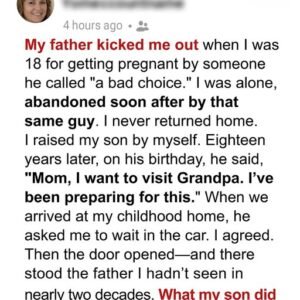When Greed Destroys Love: A Father’s Journey to Redemption
A story of sacrifice, resilience, and the power of forgiveness
The rain drummed against the bus stop’s rusted metal roof like an unforgiving metronome, each drop echoing the rhythm of Angie’s breaking heart. She clutched her newborn daughters closer to her chest, their tiny bodies wrapped in the only blanket she had managed to grab before being forced from the home she thought would shelter them forever. Sophie stirred in her left arm, her rosebud lips pursing in sleep, while Marley’s delicate fingers grasped at the air as if reaching for a father who had already turned his back on them.
“Please, God,” Angie whispered into the cold night air, her breath forming small clouds that dissipated as quickly as her dreams had just hours before. “Show us the way. Give us strength.”
The irony wasn’t lost on her that just seven days ago, she had been lying in a hospital bed, exhausted but euphoric, waiting for Jake to meet his daughters for the first time. She had imagined his face lighting up as he held them, pictured him whispering promises of protection and love into their tiny ears. Instead, he had sent his housekeeper and driver to collect them like unwanted packages, too busy with his “important business matters” to witness the miracle of his own children.
Now, as the rain intensified and the last bus of the evening disappeared around the corner, Angie found herself confronting a harsh reality she never could have imagined: she was utterly alone, with two helpless infants and nowhere to go.
The Golden Beginning
It hadn’t always been this way. Five years earlier, Angie Morrison had been a bright-eyed college graduate with dreams as vast as the sky above. She had studied education with a minor in business, planning to open her own learning center for underprivileged children. Her professors praised her dedication, her classmates admired her compassion, and her parents—God rest their souls—had been immensely proud of their only daughter’s accomplishments.
Then she met Jake Sullivan at a coffee shop near campus.
He was everything her practical mind told her to be wary of and everything her romantic heart yearned for. Tall and charismatic, with dark hair that fell just so across his forehead and green eyes that seemed to hold secrets, Jake had a way of making everyone around him feel like they were the most important person in the room. He was a junior executive at a marketing firm, full of ambitious plans and infectious enthusiasm about his future.
“You know what I love about you, Angie?” he had said during one of their early dates, reaching across the small café table to take her hand. “You see the good in everything. You make me want to be better than I am.”
Their courtship was a whirlwind of romantic gestures and shared dreams. Jake would surprise her with flowers “just because,” take her on spontaneous weekend trips to nearby cities, and spend hours listening to her plans for making a difference in the world. He seemed genuinely interested in her passion for education and would often joke that she would make an amazing mother someday.
“Our kids are going to be so lucky to have you,” he would say, spinning her around in his arms. “Patient, kind, brilliant—they’ll hit the jackpot in the mom department.”
When Jake proposed on a moonlit beach exactly two years after they met, Angie felt like she was living in a fairy tale. The ring wasn’t extravagant—Jake was still paying off student loans and building his career—but it was perfect because it came from him. They married six months later in a small ceremony at her childhood church, surrounded by friends and the few family members they each had left.
The first two years of marriage were blissful. They rented a cozy apartment, adopted a golden retriever named Murphy, and spent their evenings planning for the future. Jake was promoted twice, each advancement bringing them closer to their goal of buying a house and starting a family. Angie found work at a local elementary school, where her natural ability with children quickly made her a favorite among students and parents alike.
But somewhere during their third year of marriage, something began to shift.
The Seeds of Discontent
The change started subtly. Jake began working longer hours, claiming that a big promotion was within reach if he could just prove himself indispensable. Weekend trips became rare, then nonexistent. Date nights turned into Jake hunched over his laptop while Angie watched movies alone on the couch.
“I’m doing this for us,” he would say whenever Angie expressed concern about their growing distance. “Once I make partner, we’ll have everything we ever wanted. A big house, financial security, the works.”
When Jake did receive his promotion to senior partner at the firm, Angie expected things to return to normal. Instead, they got worse. Success, it seemed, had awakened something in Jake that she had never seen before—an insatiable hunger for more. More money, more status, more recognition.
He began talking about starting his own consulting firm, about being his own boss and really making the kind of money that would set them up for life. Their conversations, once filled with dreams of children and family traditions, now revolved around profit margins and client acquisitions.
“Don’t you see, Angie?” Jake would say, his eyes bright with ambition. “This is our chance to really make it. To have the kind of life people only dream about.”
But Angie began to wonder what good a dream life would be if they were too busy chasing it to actually live it.
The breaking point came during their fourth year of marriage, when Angie realized that despite their financial success, she felt lonelier than ever. Jake was consumed with launching his business, often gone for days at a time courting clients and investors. When he was home, he was distracted, always checking his phone or reviewing contracts.
It was during one of these lonely evenings that Angie made a decision that would change everything: it was time to start the family they had always talked about.
The Announcement That Changed Everything
Angie stared at the pregnancy test in her trembling hands, watching as two pink lines appeared with stark clarity. After months of trying, it had finally happened. She was going to be a mother.
Her first instinct was pure joy. She imagined Jake’s reaction, pictured him sweeping her up in his arms and spinning her around the way he used to. Maybe this baby would be exactly what they needed to remember what really mattered.
She planned the announcement carefully, preparing Jake’s favorite dinner and setting the table with their wedding china. When he arrived home that evening, looking exhausted and stressed, she guided him to his chair and placed the gift-wrapped box beside his plate.
“What’s this?” Jake asked, his tone suggesting he was too tired for surprises.
“Just open it,” Angie said, barely able to contain her excitement.
Jake unwrapped the box with mechanical precision, his face showing no emotion as he revealed the tiny pair of baby shoes nestled in tissue paper. For a long moment, he just stared at them, his expression unreadable.
“Angie,” he said finally, his voice flat. “Tell me this is a joke.”
The joy drained from her face. “Jake, we’re having a baby. Isn’t this wonderful? We’ve talked about this so many times—”
“That was before,” he interrupted, standing abruptly and beginning to pace. “Before the business, before I had real opportunities. Do you have any idea what kind of pressure I’m under right now? I can’t afford distractions.”
“Distractions?” Angie’s voice was barely a whisper. “Our baby is a distraction?”
Jake ran his hands through his hair, a gesture she recognized as his way of trying to maintain control. “You know I’ve just started the firm. The first year is crucial—it’s make or break time. This isn’t about not wanting children eventually, it’s about timing.”
But Angie could see something else in his eyes, something that chilled her to the bone. It wasn’t just about timing. Somewhere along the way, Jake had begun to see their potential children not as blessings, but as burdens. Not as the fulfillment of their dreams, but as obstacles to his ambitions.
“The baby is coming whether the timing is convenient or not,” Angie said, finding strength she didn’t know she possessed. “And I need to know—are you going to be a father to this child, or not?”
Jake’s response was to grab his jacket and head for the door. “I need some air,” he said. “We’ll talk about this later.”
He didn’t come home that night, or the next. When he finally returned, it was with a proposal that made Angie’s blood run cold.
“I’ve been thinking,” he said, as if he were discussing a business deal rather than their unborn child. “Maybe we should wait. There are options, you know. We could postpone this until we’re really ready.”
The suggestion hung in the air between them like a toxic cloud. Angie realized in that moment that the man she had married—the man who had once talked about their future children with such tenderness—was gone, replaced by someone she barely recognized.
A Devastating Discovery
If Jake’s reaction to one baby was devastating, his response to learning about twins bordered on cruel.
The ultrasound appointment had been scheduled for a Tuesday morning. Angie had hoped that seeing the baby on the screen might help Jake connect with the reality of impending fatherhood. She was unprepared for what the ultrasound would reveal.
“Congratulations,” Dr. Martinez said with a warm smile as she moved the wand across Angie’s belly. “You’re having twins.”
Angie’s gasp of delight was drowned out by Jake’s sharp intake of breath. She turned to look at him, expecting to see surprise, maybe even excitement. Instead, she saw something that looked remarkably like horror.
“Are you sure?” Jake asked the doctor, his voice strained.
“Absolutely certain,” Dr. Martinez replied, pointing to the screen. “Two healthy babies. Looks like they’re both girls.”
As Dr. Martinez continued the examination, chatting cheerfully about due dates and prenatal care, Angie watched Jake’s face grow paler by the minute. His hands were clenched into fists, and she could see a muscle twitching in his jaw.
The drive home was conducted in silence so thick it was suffocating. When they finally reached their house, Jake went straight to his office and shut the door. Angie could hear him on the phone, his voice rising and falling in what sounded like an argument.
That night at dinner, he finally spoke.
“Two babies, Angie. Two. Do you have any idea what that means?”
“It means we’re doubly blessed,” she replied, though her voice lacked conviction.
Jake laughed, but there was no humor in it. “Doubly blessed? More like doubly expensive. Double the diapers, double the doctor bills, double the college tuition. I can barely wrap my head around affording one child right now, and you think this is a blessing?”
Angie felt tears sting her eyes. “These are our daughters, Jake. Our children. How can you talk about them like they’re line items in a budget?”
“Because that’s what they are,” Jake snapped. “Everything costs money, Angie. Everything. And right now, I need every penny I can get to keep this business afloat. Two babies aren’t just twice the expense—they’re twice the time I won’t be able to focus on work, twice the sleep I’ll lose, twice the—”
“Twice the love,” Angie interrupted. “Twice the joy. Twice the reasons to work hard and build something meaningful.”
But Jake had already turned away, his mind made up in a way that excluded any possibility of changing course.
The Cruelest Choice
The final months of Angie’s pregnancy were a special kind of hell. Jake grew more distant with each passing week, treating her condition like an inconvenience that would eventually resolve itself. He didn’t attend doctor appointments, didn’t help prepare the nursery, and showed no interest in discussing names or making plans for the babies’ arrival.
Instead, he threw himself into his work with a fervor that bordered on obsession. He was gone before Angie woke up in the morning and rarely returned before she went to bed. When he was home, he was either on his phone or buried in paperwork, building walls between himself and the reality of his growing family.
Angie tried to reach him, tried to rekindle the connection they had once shared, but it was like trying to embrace a ghost. The man she had fallen in love with seemed to have vanished entirely, replaced by a stranger who saw her pregnancy as a threat to his ambitions rather than a gift to be cherished.
When her water broke at 3 AM on a cold February morning, Angie had to call a taxi to get to the hospital. Jake’s phone went straight to voicemail—he was at a client meeting in another city and had explicitly told her not to disturb him unless it was “a real emergency.”
Apparently, the birth of his daughters didn’t qualify.
Angie labored for fourteen hours, surrounded by nurses who kept asking where her husband was. She made excuses at first—he was out of town, he was trying to get back, he would be there soon. But as the hours stretched on and her phone remained silent, she stopped trying to explain and focused on the task at hand.
Sophie Morrison Sullivan came into the world at 4:23 PM, followed three minutes later by her sister Marley. They were perfect—tiny, pink, and impossibly beautiful. As Angie held them for the first time, she felt a love so fierce and protective that it almost overwhelmed her. These were her daughters, her babies, and she would do anything to protect them.
Jake didn’t come to the hospital. He didn’t call. Three days later, as Angie was preparing to be discharged, his housekeeper Mrs. Chen arrived with the car.
“Mr. Sullivan is very busy with an important client presentation,” Mrs. Chen explained, her discomfort obvious. “He sent me to bring you and the babies home.”
The ride back to the house was a blur of exhaustion and heartbreak. Angie had imagined this moment so many times—bringing her babies home to a father who would welcome them with open arms. Instead, she was returning to a house that felt more like a mausoleum than a home.
Jake wasn’t there when they arrived. Mrs. Chen helped Angie get settled, clearly uncomfortable with the situation but too loyal to her employer to comment. It wasn’t until evening that Jake finally appeared, looking harried and distracted.
His reaction to seeing his daughters for the first time was devastating in its coldness. He glanced at them briefly, nodded once, and then immediately began talking about his day at work.
“The Peterson account is worth more than I initially thought,” he said, loosening his tie as if the presence of his newborn children was just another minor detail to be processed. “If I can close this deal, it’ll set us up for the entire year.”
Angie stared at him in disbelief. “Jake, don’t you want to hold them? They’re your daughters.”
“I can see them,” he replied dismissively. “They look healthy. That’s good.”
That night, as Angie struggled to care for two newborns while recovering from childbirth, Jake worked late in his office. The babies’ cries didn’t seem to disturb him at all—he had always been good at blocking out anything that didn’t serve his immediate purposes.
It was on the seventh day after their birth that Jake finally revealed the depths of his selfishness.
Angie was exhausted, running on perhaps three hours of sleep total over the past week. The babies had been fussy, and she was still learning how to manage caring for two infants simultaneously. She was in the nursery, trying to calm a crying Sophie while Marley slept fitfully in her crib, when Jake appeared in the doorway.
“We need to talk,” he said, his tone suggesting a business meeting rather than a conversation between husband and wife.
Angie followed him downstairs, carrying Sophie, who had finally begun to settle. Jake gestured for her to sit on the couch, then remained standing himself, pacing back and forth in front of the fireplace like a lawyer presenting a case.
“I’ve been thinking about our situation,” he began, his words carefully measured. “And I’ve come to a decision.”
Something in his tone made Angie’s blood run cold. “What kind of decision?”
Jake stopped pacing and looked directly at her, his expression as cold as winter stone. “We keep one baby and give the other up for adoption.”
The words hit Angie like a physical blow. For a moment, she couldn’t breathe, couldn’t think, couldn’t do anything but stare at the man who had just suggested they give away one of their children like an unwanted pet.
“You can’t be serious,” she whispered.
“I’m completely serious,” Jake replied. “I’ve done the math, Angie. One child, we can manage. Two children will bankrupt us—not just financially, but in terms of time and energy. I have a business to run, and I can’t do that effectively if I’m dealing with the chaos of twins.”
“They’re babies, Jake. Our babies. You can’t just choose one and discard the other like they’re… they’re products in a catalog.”
Jake’s expression didn’t change. “I can, and I am. This is a practical decision based on practical realities. One child gets all of our resources, all of our attention, the best possible life we can provide. Two children means we’re spread too thin, and both of them suffer for it.”
Angie stood up abruptly, clutching Sophie tighter. “I won’t do it. I won’t give up either of my daughters.”
“Then you have a choice to make,” Jake said, his voice eerily calm. “Keep one baby and stay here as my wife, or take both babies and leave. But I won’t support three people when I’m barely managing to support one.”
The ultimatum hung in the air between them like a death sentence. Angie looked at the man she had married, searching desperately for some sign of the person she had fallen in love with, some indication that this was all a terrible joke or a temporary madness brought on by stress.
But Jake’s eyes were empty of warmth, empty of love, empty of any recognition that he was asking her to make an impossible choice between her children and her marriage.
“You’re asking me to choose between my daughters,” Angie said, her voice stronger than she felt.
“I’m asking you to be practical,” Jake replied. “To make the smart choice for everyone involved.”
But Angie had already made her choice. She looked down at Sophie, sleeping peacefully in her arms, then glanced toward the stairs where Marley was resting in her crib. These were her children, her flesh and blood, her responsibility and her joy. No matter what it cost her, she would not abandon either of them.
“I need to pack,” she said quietly.
Jake nodded once, as if this was the outcome he had expected all along. “Your suitcase is already by the door.”
Into the Storm
And so Angie found herself at that bus stop, homeless and heartbroken, with two week-old babies and nowhere to go. The rain continued to fall, each drop seeming to wash away another piece of the life she had thought was hers forever.
She thought about her parents, both gone now for three years, and wished desperately that they were still alive to help her. Her mother would have been horrified by Jake’s behavior, would have welcomed Angie and the babies without question. Her father would have had some choice words for his son-in-law, probably involving the wrong end of a shotgun.
But they were gone, and Angie was truly alone in the world except for the two tiny lives depending on her for everything.
“What am I going to do?” she whispered to Sophie and Marley, who were mercifully sleeping despite the cold and damp. “How am I supposed to take care of you when I can’t even take care of myself?”
It was then that she noticed the stray dog that had been lurking around the bus stop. It was a mixed breed, obviously hungry and probably as homeless as she was. But instead of threatening them, the dog seemed to be trying to offer comfort, lying down near the bench as if to provide what warmth it could.
“At least someone cares,” Angie murmured, reaching out to pet the dog’s wet fur. “Even if it’s just a stray mutt, that’s more compassion than their own father showed them.”
The irony was bitter, but it was also illuminating. If a homeless dog could show more kindness than Jake had, then perhaps there were still good people in the world. Perhaps there was still hope.
As if summoned by her desperate prayer, headlights cut through the rain and a car pulled up to the bus stop. Angie tensed, unsure whether to be hopeful or afraid. The passenger door opened, and a woman’s voice called out.
“My dear, you can’t stay out here in this weather with those babies. Please, let me help you.”
The woman who emerged from the car wore the simple habit of a Catholic nun. She was perhaps sixty years old, with kind eyes and a face that radiated the sort of peace that comes from a life dedicated to service.
“I’m Sister Margaret,” the nun said, approaching slowly so as not to frighten Angie. “I was driving back to the convent when I saw you here. Are you all right?”
Angie burst into tears, all the stress and heartbreak of the past week finally overwhelming her defenses. “I don’t know where to go,” she sobbed. “My husband… he threw us out. He wanted me to give up one of my babies, and when I wouldn’t…”
Sister Margaret’s expression hardened momentarily—not at Angie, but at the cruelty of the situation. Then her face softened again as she looked at the sleeping infants.
“What beautiful children,” she said gently. “What are their names?”
“Sophie and Marley,” Angie managed through her tears.
“Sophie and Marley,” Sister Margaret repeated, as if testing the names on her tongue. “Well, Sophie and Marley, it looks like God has sent me to help you and your brave mother tonight.”
Sanctuary
St. Catherine’s Convent was a sprawling brick building that had served the community for over a century. Originally built as an orphanage, it now housed a dozen nuns who ran a small school, operated a food pantry, and provided various social services to those in need.
Sister Margaret led Angie through the heavy wooden doors into a warmth that felt like a divine embrace. The entry hall was simple but welcoming, with polished floors and walls lined with religious artwork that somehow managed to be comforting rather than imposing.
“Sister Agnes, Sister Mary Catherine,” Sister Margaret called softly, and two other nuns appeared as if they had been waiting for her return.
“Oh my,” said Sister Agnes, a plump woman with rosy cheeks and twinkling eyes. “What have we here?”
“A mother and two babies in need of sanctuary,” Sister Margaret explained. “Angie, these are my sisters in Christ. We’ll make sure you and your little ones are safe and warm tonight.”
What followed was a flurry of gentle activity. Sister Mary Catherine, who had once worked as a nurse, examined the babies to make sure they were healthy despite their exposure to the cold. Sister Agnes prepared a simple meal and heated formula while Sister Margaret set up a small room with a bed for Angie and a makeshift nursery for the twins.
“You don’t understand,” Angie said as the nuns bustled around her with quiet efficiency. “I can’t pay you anything. I have almost nothing.”
Sister Margaret paused in her preparations and looked at Angie with infinite kindness. “Child, we don’t serve God for payment. We serve Him for love. And right now, He has asked us to love you and your daughters by giving you shelter.”
That night, for the first time in weeks, Angie slept peacefully. The babies were safe and warm, she had food in her stomach, and she was surrounded by people who had shown her more kindness in a few hours than her own husband had in months.
But even as she drifted off to sleep, she couldn’t help but wonder what would happen tomorrow, and the day after that, and all the days to come.
Building a New Life
What Angie discovered over the following weeks was that the nuns at St. Catherine’s were not just offering temporary charity—they were providing her with the foundation to rebuild her entire life.
Sister Margaret, it turned out, had once been a teacher before taking her vows, and she recognized Angie’s education credentials immediately. “We need a new instructor for our elementary program,” she explained. “The position doesn’t pay much, but it comes with housing and meals, and you could bring the babies with you to work.”
The prospect of earning her own income while keeping her daughters close was more than Angie had dared to hope for. She threw herself into the work with gratitude and determination, teaching reading and mathematics to children from the surrounding low-income neighborhoods.
Many of her students came from situations not unlike her own—single mothers struggling to make ends meet, families dealing with unemployment or addiction, children who had learned too young that life was not always fair or kind. But in Angie’s classroom, they found consistency, warmth, and someone who believed in their potential even when they didn’t believe in themselves.
Sophie and Marley thrived in the convent environment. The nuns doted on them shamelessly, and as they grew from helpless infants into curious toddlers, they became the unofficial mascots of St. Catherine’s. Sister Agnes taught them nursery rhymes, Sister Mary Catherine showed them how to tend the convent garden, and Sister Margaret read them stories about saints and miracles.
“They’re going to grow up thinking all women are nuns,” Angie joked one evening as she watched Sister Agnes show two-year-old Sophie how to knead bread dough.
“They could do worse,” Sister Margaret replied with a smile. “They’re learning that women can be strong, independent, and dedicated to something greater than themselves.”
But even as Angie found stability and purpose in her new life, she couldn’t entirely escape the pain of Jake’s abandonment. At night, when the babies were sleeping and the convent was quiet, she would sometimes find herself wondering what had become of the man she had once loved so deeply. Had his business succeeded? Was he happy with his choice? Did he ever think about the daughters he had thrown away like yesterday’s newspaper?
The Seeds of Success
By the time Sophie and Marley turned three, Angie had saved enough money to take the next step in rebuilding her life. She had always dreamed of opening her own business, and now she had both the motivation and the means to make it happen.
The coffee shop she opened was small—just six tables and a counter that served simple pastries along with what quickly became known as the best coffee in town. She called it “Second Chances Café,” and from the beginning, it was more than just a business.
Angie hired other women who were trying to rebuild their lives—former victims of domestic violence, recovering addicts, single mothers who needed flexible hours. She provided them not just with jobs, but with the kind of supportive environment that helped them regain their confidence and dignity.
“Why do you do this?” asked Maria, a young woman who had fled an abusive relationship with two small children in tow. “You could hire experienced workers who wouldn’t need so much training.”
Angie looked up from the supply order she was reviewing, her eyes reflecting the wisdom that comes from surviving your own share of hardship. “Because everyone deserves a second chance,” she said simply. “And because when women support each other, incredible things can happen.”
The café became a gathering place for the community. Mothers would bring their children for hot chocolate and homemade cookies. Students from the local college would study at the corner table for hours over a single cup of coffee. Business people would meet for casual lunches, drawn by the warm atmosphere and excellent food.
Most importantly, it became a place where people felt safe to be themselves, to share their struggles, to celebrate their victories. Angie had created something that was part business, part community center, and part sanctuary.
The success of the first café led to a second, then a third. Each location followed the same model—excellent coffee, homemade food, and a commitment to providing opportunities for women who needed them. Angie’s reputation as both a businesswoman and a community leader grew, and with it, her financial stability.
Sophie and Marley, now in elementary school, would spend their afternoons at whichever café their mother was visiting that day. They did their homework at the corner tables, helped serve cookies to regular customers, and learned by watching their mother that success was measured not just in profits, but in the positive impact you had on other people’s lives.
“Mama,” Sophie asked one day as she arranged napkins in neat piles, “why don’t we have a daddy like other kids?”
Angie’s heart clenched, but she had prepared for this question. “You do have a daddy, sweetheart. He just… he wasn’t ready to be the father you deserved. But that doesn’t mean you’re missing anything important, because you have so many people who love you.”
“Like Sister Margaret and Sister Agnes and Maria and Mrs. Thompson?” Marley chimed in, naming some of the women who had become surrogate family members.
“Exactly like them,” Angie confirmed. “Love comes in many different forms, and sometimes the family we choose is even stronger than the family we’re born into.”
But even as she spoke these words, Angie couldn’t entirely silence the small voice in her heart that still wondered what might have been if Jake had made different choices.
The Reckoning
Five years after that terrible night at the bus stop, Angie’s life had been transformed beyond recognition. She owned three successful businesses, had purchased a comfortable home in a good neighborhood, and was raising two confident, intelligent daughters who were the light of her life.
She had also, through years of therapy and spiritual guidance from the nuns at St. Catherine’s, come to a place of peace about her past. The anger and hurt were still there, but they no longer defined her. She had chosen forgiveness—not because Jake deserved it, but because carrying that burden was hurting no one but herself.
It was on a crisp autumn morning, as she was reviewing inventory at her original café, that her past came knocking.
The bell above the door chimed, and Angie looked up to see a figure that made her heart stop. Jake stood in the doorway, looking older and far less confident than she remembered. His clothes were expensive but wrinkled, his hair was graying at the temples, and there were lines around his eyes that spoke of stress and sleepless nights.
For a moment, they simply stared at each other across the space that separated them—a space that represented so much more than the fifteen feet of café floor between them.
“Hello, Angie,” Jake said finally, his voice uncertain.
“Jake.” Her voice was steady, betraying none of the turmoil she felt at seeing him again. “This is unexpected.”
He looked around the café, taking in the bustling atmosphere, the laughing customers, the obvious signs of success. “I heard about your businesses. About how well you’re doing. I’m… I’m glad.”
Angie set down her clipboard and gestured to an empty table. “Would you like to sit down?”
As they settled across from each other, Angie found herself studying the man she had once loved so completely. The arrogance that had defined him during their marriage was gone, replaced by something that looked remarkably like humility. But she had learned to be cautious about trusting appearances.
“How are Sophie and Marley?” Jake asked, and Angie was surprised to hear genuine interest in his voice.
“They’re wonderful,” she replied carefully. “They’re eight now. Smart, funny, kind. They’re everything I could have hoped for in daughters.”
Jake’s face crumpled slightly. “I have pictures,” he said quietly. “I… I’ve been following their lives from a distance. Through mutual friends, social media, the local newspaper when they won that science fair. I know I have no right, but I needed to know how they were doing.”
This revelation stunned Angie. All these years, she had assumed Jake had completely written off his daughters. The idea that he had been watching them grow up from afar added a new dimension to her understanding of his abandonment.
“Why are you here, Jake?” she asked directly.
He was quiet for a long moment, his hands wrapped around the coffee cup she had automatically brought him—black, no sugar, the way he had always preferred it. When he finally spoke, his voice was barely above a whisper.
“My business failed,” he said. “Everything I built, everything I sacrificed our family for… it’s gone. I’m bankrupt, Angie. Worse than bankrupt. I owe money to people who aren’t patient about repayment.”
So that was it. He hadn’t come because he missed his family or because he had finally realized what he had thrown away. He had come because he needed something from her.
“I’m sorry to hear that,” Angie said, and meant it. Despite everything, she didn’t wish financial ruin on anyone.
“I know I have no right to ask,” Jake continued, not meeting her eyes. “I know what I did to you, to them, was unforgivable. But I’m desperate, Angie. I need help, and you’re the only person I know who has the resources to—”
“To what?” Angie interrupted. “To bail you out? To save you from the consequences of the choices you made?”
Jake finally looked at her, and she could see tears in his eyes. “Yes,” he said simply. “I know it’s wrong to ask. I know I don’t deserve it. But I didn’t know where else to turn.”
Angie sat back in her chair, processing this request. The old Angie, the one who had loved Jake so desperately, might have said yes immediately. The woman she had become was more complicated.
“Tell me about the night you threw us out,” she said.
Jake flinched as if she had struck him. “Angie, I—”
“No,” she said firmly. “If you want my help, if you want any chance of redemption, you need to own what you did. All of it.”
Jake was quiet for a long time, his hands shaking slightly as he lifted his coffee cup. When he finally spoke, his voice was thick with emotion.
“I was terrified,” he said. “The business was everything to me—not just financially, but as proof that I was worth something. When you got pregnant, when we found out it was twins, all I could think about was how much it was going to cost, how much time it would take away from work, how it might jeopardize everything I had built.”
“So you decided to throw away your wife and children instead.”





